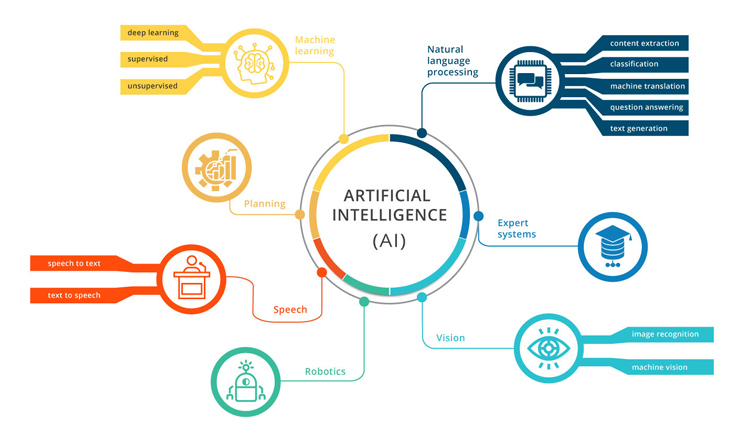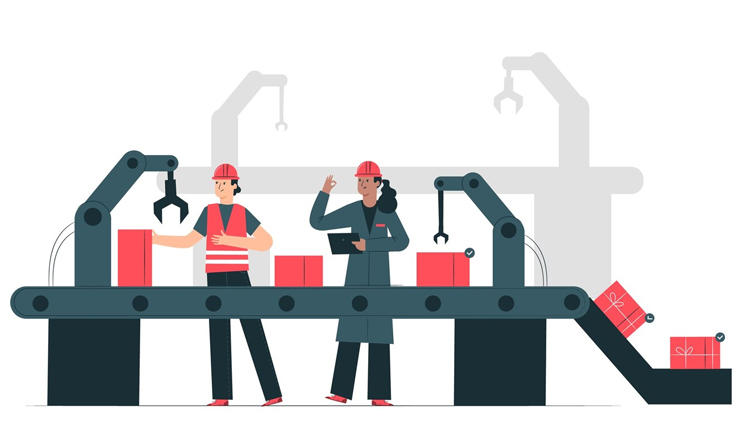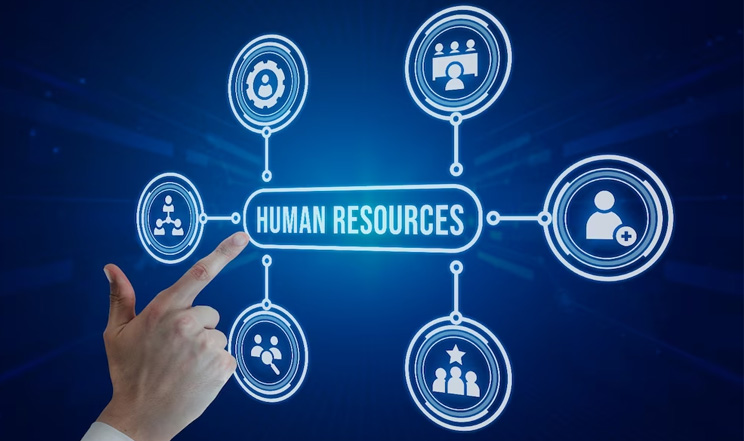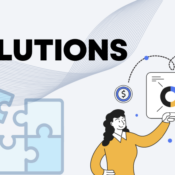The Impact of Artificial Intelligence (AI) on ERP Systems

10/28/2023
/
The Impact of Artificial Intelligence (AI) on ERP Systems
ERP systems are like super-smart computer programs that help big companies organize everything they do, like money, employees, making products, and dealing with customers. They make things work better by putting all the important information in one place and making it easier to understand.
But as businesses get more complicated, ERP systems need to get smarter. This is where artificial intelligence (AI) comes in. AI is like having super-advanced computer brains that can do things like learning from data, understanding human language, recognizing images, and talking to people. The impact of AI on ERP systems is significant because it allows these systems to become even more sophisticated and efficient, making them better equipped to handle the challenges of a rapidly evolving business environment.
With AI, ERP systems can do things that used to be done by people, like figuring out data, making decisions, automating tasks, and talking to users. So, AI is making ERP systems even more powerful and efficient in our fast-changing world.
In this blog, we will explore the impact of artificial intelligence (AI) on ERP systems.
 ERP systems play a crucial role in managing an organization’s inventory and supply chain. They help keep track of materials, finished products, and services as they move through different stages of production and various locations. Additionally, ERP systems aid in optimizing inventory levels, cutting costs, and ensuring on-time delivery to customers.
Artificial intelligence (AI) can enhance these functions of ERP systems in several ways. It can provide more precise predictions, better planning, improved inventory management, and enhanced visibility. AI can analyze large amounts of data from sources like sales records, market trends, customer feedback, etc. By using machine learning and predictive analytics, AI can generate forecasts for demand and supply. This leads to customer satisfaction and increased profitability.
AI also helps optimize inventory levels using techniques like reinforcement learning, which learns from past actions and outcomes. This minimizes costs and ensures products are available when needed, without excessive stock or shortages.
Furthermore, AI enhances visibility and traceability by employing technologies like computer vision to monitor product and material location and condition throughout the supply chain.
ERP systems play a crucial role in managing an organization’s inventory and supply chain. They help keep track of materials, finished products, and services as they move through different stages of production and various locations. Additionally, ERP systems aid in optimizing inventory levels, cutting costs, and ensuring on-time delivery to customers.
Artificial intelligence (AI) can enhance these functions of ERP systems in several ways. It can provide more precise predictions, better planning, improved inventory management, and enhanced visibility. AI can analyze large amounts of data from sources like sales records, market trends, customer feedback, etc. By using machine learning and predictive analytics, AI can generate forecasts for demand and supply. This leads to customer satisfaction and increased profitability.
AI also helps optimize inventory levels using techniques like reinforcement learning, which learns from past actions and outcomes. This minimizes costs and ensures products are available when needed, without excessive stock or shortages.
Furthermore, AI enhances visibility and traceability by employing technologies like computer vision to monitor product and material location and condition throughout the supply chain.
 Another important function of an ERP system is to support the financial planning of an organization. They collect and show financial information, like records of money coming in and going out, budgets, and forecasts. These systems also analyze the company’s financial health and performance.
AI can make these financial systems better. It can gather and organize financial data from different places, like invoices and bank statements, and do it very accurately and quickly. AI can also understand and write financial reports in plain language or different languages, reducing errors and saving time.
AI can improve financial predictions by using fancy math to learn from past data and other factors like market trends and customer behavior. It can also simulate different scenarios to see how they might affect the company's finances, helping with decisions and planning.
Additionally, AI can make financial data easier to understand by creating interactive charts and reports. It can even understand and respond to spoken commands, making it easier for people to use these financial systems.
Another important function of an ERP system is to support the financial planning of an organization. They collect and show financial information, like records of money coming in and going out, budgets, and forecasts. These systems also analyze the company’s financial health and performance.
AI can make these financial systems better. It can gather and organize financial data from different places, like invoices and bank statements, and do it very accurately and quickly. AI can also understand and write financial reports in plain language or different languages, reducing errors and saving time.
AI can improve financial predictions by using fancy math to learn from past data and other factors like market trends and customer behavior. It can also simulate different scenarios to see how they might affect the company's finances, helping with decisions and planning.
Additionally, AI can make financial data easier to understand by creating interactive charts and reports. It can even understand and respond to spoken commands, making it easier for people to use these financial systems.
 ERP systems also optimize resource coordination and align them with demand and supply requirements, such as labor, materials, and equipment.
AI can enhance this function by providing intelligent production planning, execution, and monitoring. It uses machine learning to create efficient production plans that consider various factors like capacity, demand, and deadlines. AI also adjusts plans in real time using reinforcement learning.
In terms of execution and monitoring, AI employs computer vision and sensors to collect and analyze data from machines. It detects faults and errors using anomaly detection, improving reliability and reducing downtime.
Additionally, AI enhances production optimization and quality control by learning from historical data and external factors. It recommends actions to boost efficiency and quality and generates concise reports and visualizations, improving an organization's performance and competitiveness.
ERP systems also optimize resource coordination and align them with demand and supply requirements, such as labor, materials, and equipment.
AI can enhance this function by providing intelligent production planning, execution, and monitoring. It uses machine learning to create efficient production plans that consider various factors like capacity, demand, and deadlines. AI also adjusts plans in real time using reinforcement learning.
In terms of execution and monitoring, AI employs computer vision and sensors to collect and analyze data from machines. It detects faults and errors using anomaly detection, improving reliability and reducing downtime.
Additionally, AI enhances production optimization and quality control by learning from historical data and external factors. It recommends actions to boost efficiency and quality and generates concise reports and visualizations, improving an organization's performance and competitiveness.
 ERP systems effectively segment and target customers using machine learning and clustering techniques, considering various factors like demographics and behavior. This enables organizations to tailor their marketing and service strategies, leading to more personalized customer interactions and higher satisfaction, ultimately bolstering loyalty and retention.
AI further elevates CRM by utilizing natural language processing for creating customized messages and content. It also enables voice-based interactions through speech recognition, chatbots, and virtual assistants. With sentiment analysis and emotion recognition, AI can gauge customer mood and adapt responses, significantly enhancing the overall customer experience.
ERP systems effectively segment and target customers using machine learning and clustering techniques, considering various factors like demographics and behavior. This enables organizations to tailor their marketing and service strategies, leading to more personalized customer interactions and higher satisfaction, ultimately bolstering loyalty and retention.
AI further elevates CRM by utilizing natural language processing for creating customized messages and content. It also enables voice-based interactions through speech recognition, chatbots, and virtual assistants. With sentiment analysis and emotion recognition, AI can gauge customer mood and adapt responses, significantly enhancing the overall customer experience.
 ERP systems are an integral part of Human Resource Management (HRM), encompassing areas like recruitment, training, performance evaluation, and compensation. They aim to enhance employee management by providing comprehensive insights into employee data.
AI significantly augments HRM within ERP systems. It streamlines recruitment and hiring processes, utilizes natural language processing to create tailored training programs, and monitors employee progress during training. AI also improves performance evaluation by analyzing historical data, offering automated feedback, and understanding employee sentiment.
Furthermore, AI optimizes compensation and benefits, considering various factors, and provides clear reports on key employee metrics.
ERP systems are an integral part of Human Resource Management (HRM), encompassing areas like recruitment, training, performance evaluation, and compensation. They aim to enhance employee management by providing comprehensive insights into employee data.
AI significantly augments HRM within ERP systems. It streamlines recruitment and hiring processes, utilizes natural language processing to create tailored training programs, and monitors employee progress during training. AI also improves performance evaluation by analyzing historical data, offering automated feedback, and understanding employee sentiment.
Furthermore, AI optimizes compensation and benefits, considering various factors, and provides clear reports on key employee metrics.
Inventory and Supply Chain Management
 ERP systems play a crucial role in managing an organization’s inventory and supply chain. They help keep track of materials, finished products, and services as they move through different stages of production and various locations. Additionally, ERP systems aid in optimizing inventory levels, cutting costs, and ensuring on-time delivery to customers.
Artificial intelligence (AI) can enhance these functions of ERP systems in several ways. It can provide more precise predictions, better planning, improved inventory management, and enhanced visibility. AI can analyze large amounts of data from sources like sales records, market trends, customer feedback, etc. By using machine learning and predictive analytics, AI can generate forecasts for demand and supply. This leads to customer satisfaction and increased profitability.
AI also helps optimize inventory levels using techniques like reinforcement learning, which learns from past actions and outcomes. This minimizes costs and ensures products are available when needed, without excessive stock or shortages.
Furthermore, AI enhances visibility and traceability by employing technologies like computer vision to monitor product and material location and condition throughout the supply chain.
ERP systems play a crucial role in managing an organization’s inventory and supply chain. They help keep track of materials, finished products, and services as they move through different stages of production and various locations. Additionally, ERP systems aid in optimizing inventory levels, cutting costs, and ensuring on-time delivery to customers.
Artificial intelligence (AI) can enhance these functions of ERP systems in several ways. It can provide more precise predictions, better planning, improved inventory management, and enhanced visibility. AI can analyze large amounts of data from sources like sales records, market trends, customer feedback, etc. By using machine learning and predictive analytics, AI can generate forecasts for demand and supply. This leads to customer satisfaction and increased profitability.
AI also helps optimize inventory levels using techniques like reinforcement learning, which learns from past actions and outcomes. This minimizes costs and ensures products are available when needed, without excessive stock or shortages.
Furthermore, AI enhances visibility and traceability by employing technologies like computer vision to monitor product and material location and condition throughout the supply chain.
Financial Planning
 Another important function of an ERP system is to support the financial planning of an organization. They collect and show financial information, like records of money coming in and going out, budgets, and forecasts. These systems also analyze the company’s financial health and performance.
AI can make these financial systems better. It can gather and organize financial data from different places, like invoices and bank statements, and do it very accurately and quickly. AI can also understand and write financial reports in plain language or different languages, reducing errors and saving time.
AI can improve financial predictions by using fancy math to learn from past data and other factors like market trends and customer behavior. It can also simulate different scenarios to see how they might affect the company's finances, helping with decisions and planning.
Additionally, AI can make financial data easier to understand by creating interactive charts and reports. It can even understand and respond to spoken commands, making it easier for people to use these financial systems.
Another important function of an ERP system is to support the financial planning of an organization. They collect and show financial information, like records of money coming in and going out, budgets, and forecasts. These systems also analyze the company’s financial health and performance.
AI can make these financial systems better. It can gather and organize financial data from different places, like invoices and bank statements, and do it very accurately and quickly. AI can also understand and write financial reports in plain language or different languages, reducing errors and saving time.
AI can improve financial predictions by using fancy math to learn from past data and other factors like market trends and customer behavior. It can also simulate different scenarios to see how they might affect the company's finances, helping with decisions and planning.
Additionally, AI can make financial data easier to understand by creating interactive charts and reports. It can even understand and respond to spoken commands, making it easier for people to use these financial systems.
Manufacturing and Production
 ERP systems also optimize resource coordination and align them with demand and supply requirements, such as labor, materials, and equipment.
AI can enhance this function by providing intelligent production planning, execution, and monitoring. It uses machine learning to create efficient production plans that consider various factors like capacity, demand, and deadlines. AI also adjusts plans in real time using reinforcement learning.
In terms of execution and monitoring, AI employs computer vision and sensors to collect and analyze data from machines. It detects faults and errors using anomaly detection, improving reliability and reducing downtime.
Additionally, AI enhances production optimization and quality control by learning from historical data and external factors. It recommends actions to boost efficiency and quality and generates concise reports and visualizations, improving an organization's performance and competitiveness.
ERP systems also optimize resource coordination and align them with demand and supply requirements, such as labor, materials, and equipment.
AI can enhance this function by providing intelligent production planning, execution, and monitoring. It uses machine learning to create efficient production plans that consider various factors like capacity, demand, and deadlines. AI also adjusts plans in real time using reinforcement learning.
In terms of execution and monitoring, AI employs computer vision and sensors to collect and analyze data from machines. It detects faults and errors using anomaly detection, improving reliability and reducing downtime.
Additionally, AI enhances production optimization and quality control by learning from historical data and external factors. It recommends actions to boost efficiency and quality and generates concise reports and visualizations, improving an organization's performance and competitiveness.
Customer Relationship Management (CRM)
 ERP systems effectively segment and target customers using machine learning and clustering techniques, considering various factors like demographics and behavior. This enables organizations to tailor their marketing and service strategies, leading to more personalized customer interactions and higher satisfaction, ultimately bolstering loyalty and retention.
AI further elevates CRM by utilizing natural language processing for creating customized messages and content. It also enables voice-based interactions through speech recognition, chatbots, and virtual assistants. With sentiment analysis and emotion recognition, AI can gauge customer mood and adapt responses, significantly enhancing the overall customer experience.
ERP systems effectively segment and target customers using machine learning and clustering techniques, considering various factors like demographics and behavior. This enables organizations to tailor their marketing and service strategies, leading to more personalized customer interactions and higher satisfaction, ultimately bolstering loyalty and retention.
AI further elevates CRM by utilizing natural language processing for creating customized messages and content. It also enables voice-based interactions through speech recognition, chatbots, and virtual assistants. With sentiment analysis and emotion recognition, AI can gauge customer mood and adapt responses, significantly enhancing the overall customer experience.
Human Resource (HR) Management
 ERP systems are an integral part of Human Resource Management (HRM), encompassing areas like recruitment, training, performance evaluation, and compensation. They aim to enhance employee management by providing comprehensive insights into employee data.
AI significantly augments HRM within ERP systems. It streamlines recruitment and hiring processes, utilizes natural language processing to create tailored training programs, and monitors employee progress during training. AI also improves performance evaluation by analyzing historical data, offering automated feedback, and understanding employee sentiment.
Furthermore, AI optimizes compensation and benefits, considering various factors, and provides clear reports on key employee metrics.
ERP systems are an integral part of Human Resource Management (HRM), encompassing areas like recruitment, training, performance evaluation, and compensation. They aim to enhance employee management by providing comprehensive insights into employee data.
AI significantly augments HRM within ERP systems. It streamlines recruitment and hiring processes, utilizes natural language processing to create tailored training programs, and monitors employee progress during training. AI also improves performance evaluation by analyzing historical data, offering automated feedback, and understanding employee sentiment.
Furthermore, AI optimizes compensation and benefits, considering various factors, and provides clear reports on key employee metrics.
Conclusion
The impact of AI on ERP systems is profound, offering the potential for enhanced performance and efficiency. While AI excels at tasks such as decision-making and data analysis within ERP software solutions, businesses need to carefully consider using AI in their ERP systems to make it work well and help their business succeed. It's happening right now, not in the future. So, businesses should embrace AI and use it to improve their systems.Recent Posts
Monika Narriya/0 Comments
Why are ERP solutions important in the education sector?
Monika Narriya/0 Comments
Which is the best ERP solution provider company?
Monika Narriya/0 Comments
How do we select the right ERP solution for our businesses?
Sumit Kumar/0 Comments
9 Most In-Demand Programming Languages for 2024
Sumit Kumar/0 Comments
Best Time to Post on Social Media – 2024 Guide
Sumit Kumar/0 Comments
Why You Should Consider Semantic HTML for SEO
All Categories
- Bing
- Blockchain
- Blog
- Branding
- Case Study
- Content Marketing
- Conversion Rate Optimization
- Cryptocurrency
- Digital Currency
- Digital Marketing
- Email Marketing
- ERP Solutions
- Facebook Marketing
- Google Ads
- Google Updates
- Graphic Designing
- Hire Developers
- Image SEO
- Influencer Marketing
- IT
- Local SEO
- Machine Learning
- Mobile Application Development
- Pay Per Click
- Pinterest SEO
- Podcast Hosting
- React JS
- Reddit & Quora
- Search Engine Optimization
- SEO Copywriting
- Social Media Marketing
- Software
- Software Development
- Technology
- UX and UI
- Web Designs
- Web Hosting
- Website Development
- Website Redesigning
- YouTube SEO








